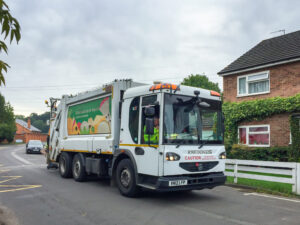The list of professions that no longer have to follow self-isolation rules has been expanded to include rubbish collectors, vets and tax collectors in an attempt to limit disruption caused by the “pingdemic”.
A pilot study has suggested that only one in 145 workers who come into contact with someone who has tested positive for coronavirus go on to contract it themselves.
Food distributors, paramedics and train drivers have already been freed from quarantine requirements for work purposes amid government concerns about the crippling effects of self-isolation on key industries. Eligible staff are still expected to follow isolation rules when they are not at work.
Last night ministers expanded the list of professions where employees can take daily lateral flow tests to avoid self-isolation after a meeting of the Covid-O committee. People working in the armed forces, prisons and rubbish collection will join workers in energy, pharmaceuticals, telecoms, chemicals, communications, water, space, fish, veterinary medicine and tax collection in avoiding quarantine.
There are concerns, however, about testing capacity as it was revealed that only one in 20 of the screening sites promised by the government for key industries had been set up by the start of the week.
Food manufacturers and supermarket depot workers warned that some shortages were still likely in coming days as they believe that it will take about a week to set up Covid testing facilities.
Businesses responsible for 500 of the most critical sites for the food supply chain in England were invited to a webinar hosted by the government yesterday that explained how they could make their workers exempt from isolation rules. Food manufacturers said that the webinar showed businesses will have to go through “really quite rigorous protocols” to be eligible for exemption.
“You’ll be building something that looks quite a lot like a vaccination centre,” said Shane Brennan, of the Cold Chain Federation, whose members operate frozen and chilled storage facilities for food. Brennan said shoppers would “probably continue to see some interruptions in supply”, adding that the government’s leadership was an “incoherent mess”.
Ministers promised a further 1,200 testing centres for key industries to add to the 800 already announced, which will enable Border Force staff, transport workers, food suppliers and emergency workers to continue going into work.
All self-isolation rules will be lifted for the double-vaccinated on August 16.
A workplace pilot study introduced across 20 public bodies including the Cabinet Office, Border Force and Network Rail has suggested that daily testing could be an effective way of containing the spread of the disease.
The pilot allowed employees to take daily tests if contacted by NHS Test and Trace rather than go into self-isolation.
Boris Johnson and Rishi Sunak considered taking advantage of the pilot earlier this month before the prime minister and the chancellor agreed to go into quarantine for ten days. In reply to a written question about the scheme, Jo Churchill, a health minister, revealed yesterday that only 25 people on the pilot had tested positive for coronavirus out of 3,596 individuals who came into contact with an infected person.
Professor John Edmunds, an epidemiologist at the London School of Tropical Hygiene and Medicine and a member of Sage, said there was now “promising” evidence that daily testing could be an effective alternative to self-isolation, although he said further studies in the coming days would provide more conclusive results.
“The evidence for the effectiveness of daily testing of contacts as an alternative to self-isolation is looking promising,” he told The Times. “Well-conducted randomised controlled trials provide the best evidence of the effectiveness, or otherwise, of an intervention. As the results should be available very shortly, it makes some sense to wait for this trial to deliver.”
A recent study of school pupils found that only 2 per cent of those contacted turned out to be positive, suggesting that the use of rapid testing did not lead to an increased spread of the disease.
Sir Keir Starmer clashed with unions yesterday over the question of whether workers in critical industries should stay at home if they are pinged.
The leaders of the UK’s largest unions have encouraged key workers, including in transport and food, to ignore the new exemptions and self-isolate if contacted by Test and Trace.
However, the Labour leader warned them against taking strike action over the issue, telling LBC: “I don’t think that is the right way. If it is possible to show that with a double vaccination and a negative test critical workers can go back to work, I would support that. Obviously we need to keep an eye on how safe it is, we need to be cautious, but we do need to keep our critical sectors working and I think we should support exemptions that allow us to do that.”
Mick Lynch, head of the RMT union of rail workers, had told Today on Radio 4 that failing to isolate endangered colleagues and passengers.
Sajid Javid, the health secretary, said that daily contact tracing would play a key role in stopping transmission.
Read more:
Workers exempted from Covid-19 self-isolation to include binmen, vets and tax collectors
















